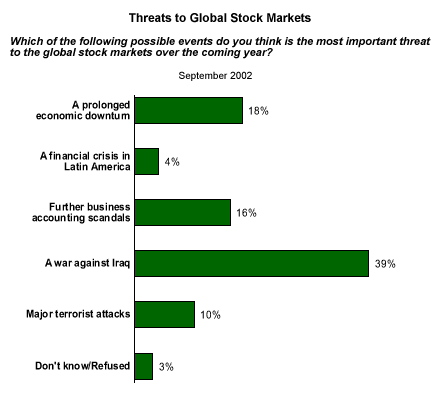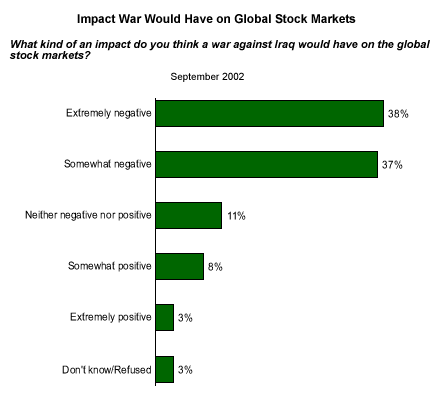European investor optimism plummeted in September, according to the Index of Investor Optimism -- EU5, a joint measure by UBS and The Gallup Organization to measure investor sentiment in five key European nations. The EU5 Index currently stands at -24, indicating investors in Europe are now pessimistic as a group. In August, they were essentially neutral -- neither notably optimistic nor pessimistic. This is the first time EU5 investor sentiment has been significantly pessimistic since the EU5 Index was established in October last year (see "Investor Sentiment Plummets in Europe" under Related Items).
Why are European investors so pessimistic at this point? Are EU5 investors suffering from the same crisis of confidence that has afflicted U.S. investors in recent weeks? New poll data suggest that may indeed be the case -- but while the primary source of skittishness among U.S. investors appears to be concern over corporate accounting issues, EU5 investors seem to be most fearful of a potential war with Iraq.
Threats to the Global Markets
In August, more than one in four European investors (28%) told Gallup they think questionable business accounting is the most important reason the stock markets continue to be weak. Slightly fewer than one in four (23%) said they think that the uncertain economic outlook or a combination of factors are weighing on the equity markets. And fewer than one in 10 European investors pointed to the threat of terrorist attacks, tensions in the Middle East, or overpriced stocks.
But by September, perceptions about the relative significance of these various factors had changed significantly. About four in 10 European investors (39%) told Gallup that a possible war with Iraq is the most important threat to the global stock markets over the coming year. Nearly one in five (18%) said a prolonged economic downturn was the most important threat, while 16% pointed to further business accounting scandals.

War With Iraq
More than half of all EU5 investors (55%) expect the United States to lead a military attack against Iraq within the next six months. Another 15% say they expect the attack within the next year. And one in five European investors (21%) say they do not anticipate such an attack in the foreseeable future.
If an attack on Iraq does take place, 38% of EU5 investors say it will have an extremely negative impact on the global stock markets; about the same number (37%) say it will have a somewhat negative impact. Eleven percent say it will have neither a positive nor a negative impact, while the same number say it will have a somewhat or extremely positive impact on the global stock markets.

Key Points
It is not really surprising that a potential war with Iraq is perceived substantially differently by investors in the United States and those in Europe. In the U.S. experience, such conflicts have not been extremely disruptive economically. The last war with Iraq had only a short-term negative impact, followed by nearly 10 years of historically low oil prices -- a net positive result. Further, the war in Afghanistan has had virtually no economic impact with the exception of some additional federal spending.
I believe many people in Europe think of a potential war in a different context. Their memories are of a post-World War II period significantly different from that in the United States. When they think of war, many Europeans envision much more profound social consequences -- economic and otherwise.
While I don't share the fears of the European investors Gallup interviewed, the magnitude of their concerns gives me pause. War is always a very uncertain undertaking. As a result, the potential for war itself generates significant risk premiums in the price of oil and other commodities. The existence of those risk premiums alone could have a significantly negative impact on the economy in the near term.
If the terrorist attacks of a year ago contributed to last year's economic downturn, could war with Iraq have a similar effect? European investor sentiment suggests that it is something to think about as business leaders plan for the first half of 2003.
*Results for the Index of Investor Optimism -- EU5 are based on interviews with approximately 200 investors each in France, Germany, Great Britain, Italy, and Spain conducted Sept. 1-15, 2002. For results based on a total sample of approximately 1,000 investors, one can say with 95% confidence that the margin of sampling error is ±3%. In addition to sampling error, question wording and practical difficulties in conducting surveys can introduce error or bias into the findings of public opinion polls.

